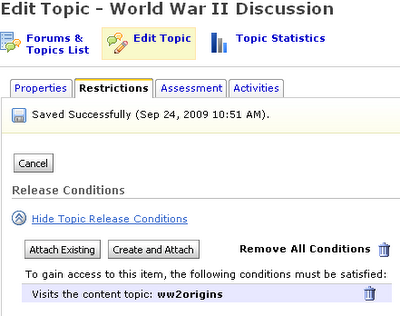- On the Classlist, click on the Progress Report icon (
 ) for a student.
) for a student. - Click the Change button and choose the Content tool and click Apply.
- The page shows a list of all content modules and topics - a closed eye next to a module/topic name indicates that particular student cannot see that particular module or topic
Showing posts with label release conditions. Show all posts
Showing posts with label release conditions. Show all posts
06 September 2012
Who Can See a Particular Content Module or Topic?
If you use release conditions to plan an individualized learning path through your course content, you can see which topics a particular student can see by viewing that student's progress report:
Labels:
classlist,
content,
release conditions,
students
15 December 2009
Grades for Students with Different Assignments
You may have a class where not all students do all assignments, and you want each student to have a points possible in the grades area that matches the assignments required for that student. For example, students who are returning to take the same class might have advanced assignments not required of their beginning classmates. To do this requires the use of groups, calculated grade items, and release conditions:
Labels:
assignments,
grades,
groups,
release conditions
24 September 2009
Saving Time with Release Conditions
If you reuse course components for a new semester, you may find it tedious to change the availability dates for the content modules, quizzes, dropbox folders, and discussion topics in the new course offering. One trick to save some time is to use release conditions to make certain items invisible until a student has taken some other action.
For example, you might not want them to post a comment in a discussion topic until they have visited the relevant content topic. If the discussion topic is conditionally released based on visiting that content topic, you can dispense with setting a date for that discussion topic to appear. Here are the steps for this example:
For example, you might not want them to post a comment in a discussion topic until they have visited the relevant content topic. If the discussion topic is conditionally released based on visiting that content topic, you can dispense with setting a date for that discussion topic to appear. Here are the steps for this example:
- On the item to be conditionally released, click on the Restrictions tab and then click the button to Create and Attach in the Release Conditions section of this page.
- Choose the type Content Topic visited and then choose the appropriate content topic
- Click the Create button and your release condition will appear (don't forget to click Save)
08 December 2008
Limit a Syllabus to Certain Students
Revised 11/2013
If you group students from multiple classes into the same course offering, you may want to show some content (like the syllabus) to students enrolled in a certain class. Use the release conditions to do this. Here are the steps:
If you group students from multiple classes into the same course offering, you may want to show some content (like the syllabus) to students enrolled in a certain class. Use the release conditions to do this. Here are the steps:
- When creating a new topic or editing an existing topic, click the Restrictions tab (this is the same tab that has the date restrictions)
- In the Release Conditions section, click the button Create and Attach
- Select Section Enrollment as the condition type in the pull-down menu that appears
- In the Condition Details portion of the window, choose the section from the pull-down list - you will need to match the five-digit enrollment code that is part of the section name
- Click Create and you will see your release condition at the bottom of this page.
- Click Save and this content will only be visible to students who meet the criteria you selected.
Subscribe to:
Posts (Atom)





